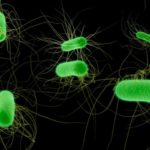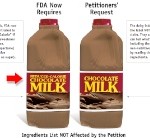A study published in the International Journal of Molecular Science looked at the effect of artificial sweeteners on gut bacterial pathogenicity. They found that artificial sweeteners may increase damage in the gut, by increasing the ability of bacteria to form a biofilm and the ability of the bacteria to adhere to, invade, and kill the host epithelium, which is the lining of the gut. Researchers demonstrated that saccharin, sucralose, and aspartame all promote pathogenic changes in two model gut bacteria, E. coli and E. faecalis, which could "worsen the effect of consuming artificial sweetener in the diet on gut health." This is important because bacteria growing in biofilms are less sensitive to antimicrobial resistance treatment and are more likely to express virulence factors … [Read more...]
FDA Rejects Calls for Aspartame Ban
The FDA has rejected calls for a ban on aspartame, stating that no credible scientific evidence for the ban has been presented. In a FDA Letter to Paul Stoller, the government says they have been monitoring scientific data on aspartame since the 1970s and believes that the compound is "safe for the general population except for individuals with phenylketonuria." And in another FDA Letter to Betty Martini, the government denies her request to recall aspartame. The FDA said it conducted an analysis of 195 cases of aspartame-related reported adverse events between January 2004 and December 2013 and "had not identified any causal link between aspartame consumption and the reported adverse events." The National Cancer Institute states "there is no clear evidence that the artificial … [Read more...]
New Study Says Artificial Sweeteners May Induce Glucose Intolerance
A new study published in Nature and conducted by researchers in Israel states that while more study is needed, artificial sweeteners may induce glucose intolerance and promote diabetes. They say that the chemicals change the composition of bacteria in your gut, which changes how the body handles sugar. Studies have shown that these artificial sweeteners do not aid in weight loss, and may actually contribute to weight gain. Non-caloric sweeteners (NAS), or artificial sweeteners such as aspartame are widely used. While they are considered generally safe, scientific data supporting that view is sparse. Obesity and diabetes are linked to changes in gut bacteria, so the scientists looked at the effect of these chemicals on the microbiome in intestines. The researchers added saccharin … [Read more...]
FDA Wants Your Opinion on Dairy Product Label Change
The Food and Drug Administration (FDA) wants your opinion on new dairy product labels. A petition submitted to the FDA states that industry groups believe labels such as "no added sugar" or "reduced calorie" are a "turn-off" to kids who may otherwise drink flavored milk with non-nutritive (artificial) sweeteners at the school cafeteria and other venues. The petition is from the International Dairy Foods Association (IDFA) and the National Milk Producers Federation (NMPF). The comment period for this proposed change is open until May 21, 2013. FDA has received more than 30,000 comments on this issue to date. But it seems that many consumers are confused about what the labeling change means. The petition would change the "standard of identity" for milk, which determines what … [Read more...]
Diet Soda, Fruit Punch Consumption Linked to Depression
A new study conducted at the National Institutes of Health has found a link between depression and consumption of diet soda. Conversely, drinking coffee is tied to a slightly lower risk of developing that disease. The study will be released in March at a meeting of the American Academy of Neurology. Researchers looked at the soda, tea, fruit punch, and coffee consumption of 263,925 people between the ages of 50 and 71, in the years 1995 and 1996. They then studied the mental health of those patients from 1985 to 2000, and found that people who consumed at least four cans of diet soda every day had a 30% greater risk of developing depression. The scientists also found that those who drank four cans of fruit punch every day were 38% more likely to develop depression than those who did not … [Read more...]
Dieting? Artificial Sweeteners May Not Be the Answer
Two studies presented at the June 2012 America Diabetes Association meeting showed that drinking diet pop is associated with weight gain in humans, and with higher blood glucose levels in mice. Epidemiologists at the School of Medicine at the University of Texas San Antonio looked at the relationship between diet pop consumption and waist circumference. They studied 474 patients over 10 years in the San Antonio Longitudinal Study of Aging (SALSA), which includes elderly Mexican-Americans and European-Americans. The results of the study were adjusted for diabetes status, physical activity level, neighborhood, age, smoking status, sex, ethnicity, and education. Researchers found that diet soft drink users had a 70% greater increases in waist circumference compared with those who did … [Read more...]
Does Your Guy Drink Soda? He May Want to Think Again.
A new Harvard study, published in the journal Circulation, found that men who drink sugary beverages may have a higher risk of heart attack. The beverages in the study included sodas, fruit drinks, energy drinks, sports drinks, and sugar-sweetened water. And the more sodas he drinks, the higher the risk. Two high-sugar drinks a day were linked to a 42% increase in risk. Three sodas? A 69% increase. Apparently sugar intake is associated with higher levels of intermediate biomarkers, such as c-reactive protein levels (CRP), that indicate inflammation. Inflammation is a key factor in the development of heart disease. The Health Professionals Follow-up study examined 42,883 men. Men in the top fourth of sugar-sweetened beverage intake had a 20% higher relative risk of coronary heart … [Read more...]









